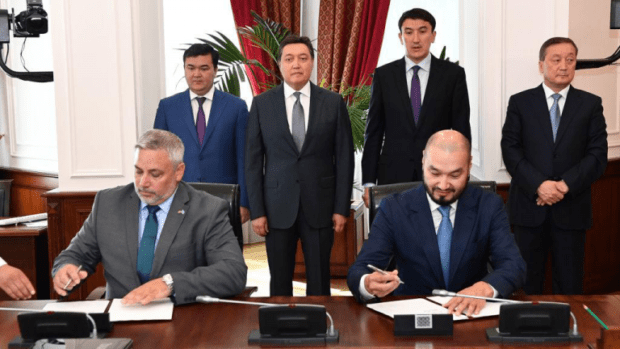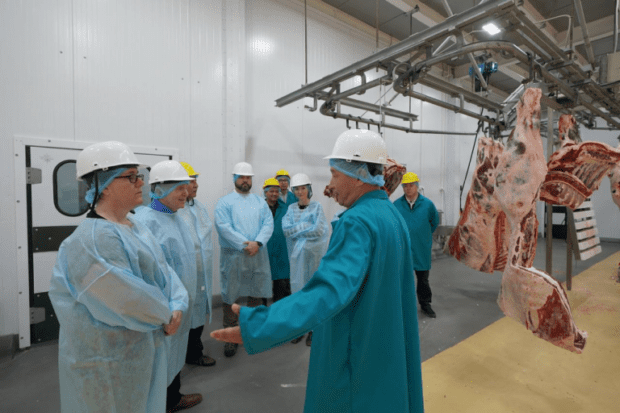Yerkin Tatishev of Kusto Group: Kazakhstan can produce enough meat to feed 2 billion people

The well-known Kazakh businessman, Yerkin Tatishev, who serves as the chairman of the board of directors of the Kusto Group, asserts that a developed agricultural sector in Kazakhstan could rival the country’s profitable oil industry.
One of Kazakhstan ‘s most influential businessmen, Yerkin Tatishev, has begun to cultivate his dream of creating a modernized meat production industry in Kazakhstan. According to Daniel Kunin, a managing director at Kusto Group, this effort, “requires long-term thinking, strategic planning, intensive stakeholder mapping and understanding, and the creation of a network of inter-linked partnerships that are both joint ventures but also intensive public-private partnerships.”
Tatishev’s organization aspires to bring a new level the production and quality of all types of meat – beef, lamb, chicken, and, of course, pork. While there might not be demand in the local population for pork due to different eating habits, the market for export is ripe.
“Now Kazakhstan produces about 800 thousand tons of meat per year, and it consumes all this volume itself. In addition, part of the domestic demand is covered by imports, especially for chicken,” said Yerkin Tatishev. “Kazakhstan’s production potential in this area is estimated at about 10 million tons per year. Valued at around $ 30–40 billion! This income is comparable to our oil industry, which today returns about $ 40-50 billion a year.”
Raising quality standards in the industry
According to Tatishev’s assessment, due to the current underdevelopment of Kazakhstan’s meat industry, the country has a unique opportunity to become a producer of high-quality protein – without hormones, without antibiotics, without GMOs. This type of product is in high demand across world markets right now.
While this class of meat cannot be designated as organic, in America, it is given the special classification of ‘natural’. Despite its often-higher price tag, demand for this kind of meat is increasing. There is a general understanding that unnatural products are unhealthy and, especially for children. Market forces demonstrate that we are ready to pay more for quality and safety.
“Of course, when you are hungry, you only care that something is on the table,” said Yerkin Tatishev. “But as you develop, you begin to be more concerned about quality. And Kazakhstan has a real chance to become one of the top 5 producers of high-quality protein in the world – this is what our American partners tell us when we discuss future plans. According to them, our country today – the only feasible one in the world – has all the necessary ingredients to follow an American-style development of livestock husbandry. That is, to utilize a fattening diet based on corn and soy.”
“The warm climate in Brazil, Argentina and Australia forces these countries to use grass-fed feeding, plus hormones and other methods to raise livestock, and as a result, they produce economy-class meat – that’s how it works. And in Kazakhstan, you can build a system from scratch that will be similar to the American premium-quality meat industry. Our land provides us with such an opportunity. Therefore, I believe that the future of Kazakhstan is the agricultural industry.”

Kusto Group’s philosophy of building on successful experiences
Last year, Kusto Group became the main shareholder of KazBeef, the largest producer of high-quality beef in Kazakhstan. The group also includes KazSeed, a producer of feed crops. Both entities have developed partnerships with specialists from the United States to support their operations.
Next for the multi-sector Kusto Group is another joint US-Kazakhstan venture – the creation of a production factory for modern irrigation equipment. Then Kusto will partner with Valmont Industries, the largest producer of irrigation systems in the United States, on the project. The location of the facility is now being determined, but it is already clear that it will likely be located in the center or north of the country where the primary demand for irrigation systems is concentrated.
“The successful development of these projects shows the reality of the plans,” said Yerkin Tatishev. Subsequently, KazBeef using modern advanced technology and best practices can produce 6 thousand tons of high-quality beef in a year. At the same time, demand so far exceeds supply. And that means there is no ceiling for growth.
“Even in Kazakhstan, we are capable of producing much more than we produce now,” the businessman said. “Currently all of our products are delivered domestically to the Metro network. This doesn’t even include exports. The Chinese recently came to us and offered a contract for 100 thousand tons of meat per year. Naturally, they are interested in our high-quality product. The sales prospects are huge! In China, there is a growing understanding of the importance of meat quality, and the middle class is shaping a rising demand for this type of product. We are seeing this trend all across the world.”
When asked why Kazbeef’s meat project, which started in Kazakhstan back in 2011, is difficult and takes so much time, Yerkin Tatishev answers, “Development started from the bottom. There was a period when the breeding stock of cattle was reduced to a minimum, and it had to be restored. The issue of improving genetics is still not fully resolved. KazBeef established its breeding stock by importing pedigree cattle from abroad. Now, we need to increase this population.”
There is also the priority of adequate quality livestock feed. To accomplish this, it is necessary to expand the production of corn, soybeans, alfalfa. This must happen while also working on the genetics of these feed crops, adapting them to the climate in Kazakhstan. All of this takes time.
“I don’t think that there is anything that is stopping us from developing the industry right now,” said Yerkin Tatishev. “It’s just that there hasn’t been a transformational approach to this issue like this. We were always limited by the level of food security, food security – so that we could feed ourselves. But it turns out that Kazakhstan can not only feed itself but also many others in the world. Relatively speaking, a couple of billion people.”
“And it’s all renewable, and therefore, eternal. Someday, the oil will run out, as all fossil fuels do – everything has a limit. There is no limit on land and water. If we do this with a competent approach, using the right technology with the best practices in the world, then we will ensure sustainable development. It is like solar energy – it will be eternal. And on the basis of a strong animal husbandry sector, you can create an entire industry, supported by a great number of farms and providing a great number of jobs.”

Agrarian culture
The advent of the protein industry will have a ripple effect on the development of the entire economy, Tatishev has no doubt. Mechanical engineering, fertilizer production, IT technologies, without which modern agribusiness cannot exist, everything will get an economic boost. And, of course, processing enterprises at all levels – from leather making to sausage production. The businessman is counting on a powerful synergistic effect, which will lead to a qualitative transformation of Kazakhstan’s agricultural industry and economy.
“The most notable difference between the agro-industry and the oil industry – is that in the agro sector, you cannot work narrowly,” the entrepreneur said. “You need an entire ecosystem that includes everything from feed production to processing. The complexity can be daunting, but this is the advantage: when you create it, a huge number of people are involved in it. And everyone starts earning.”
“We are beginning to see this in Ukraine, where we have a Kusto Agro farming operation which has 25 thousand hectares of land. The only industry that has been feeding Ukraine all these years is the agro-industry. They now operate and compete at a high international level – with European technologies, good genetics, excellent agronomy, high salaries. All their equipment is imported, delivering high-performance. And they did it in 15 years. And we simply haven’t done the same. Now, let’s consider if Kazakhstan does the same. In 10-15 years, we will have a top-level agro-industry, that employs 5-6 million people. That represents the entire rural population of Kazakhstan.”
Kusto Group plans on working together with the government of Kazakhstan to create a roadmap to develop a thriving livestock industry. This industry development plan will determine the growth and advancement of the sector for the next 20 years. To make the plan viable and achievable, research centers will be involved in its design. In particular, Texas A&M, a leading US agrarian university, is already participating in the development of the project.
The framework for the agro-industry development plan will take shape in the next two months. The basic elements will be established, and then we will get the word out to businesses. Without foreign investment and the participation of local entrepreneurs, the project will hit a dead-end, unable to move forward. But when you turn the car around, everyone wins, Yerkin Tatishev is sure.
“I don’t like the expression ‘agriculture,’ you cannot say that,” said the businessman. “In America, there is agricultural – an agrarian culture that they are proud of. In this sector, there are decent, well-paid jobs. Everything is very professionally done – farms, factories. We want to have the same agricultural industry, and not the Soviet model of “agriculture”, which was not able to feed the country despite our vast natural resources. Moving forward, we must frame our thinking about the agro-industry in such a way that we focus not only feeding ourselves but also on being able to produce much more for export.”
